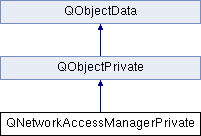 |
Qt 4.8
|
 |
Qt 4.8
|
#include <qnetworkaccessmanager_p.h>

Static Public Functions | |
| static Q_AUTOTEST_EXPORT void | clearCache (QNetworkAccessManager *manager) |
| static QNetworkAccessCache * | getObjectCache (QNetworkAccessBackend *backend) |
 Static Public Functions inherited from QObjectPrivate Static Public Functions inherited from QObjectPrivate | |
| static void | clearGuards (QObject *) |
| static QObjectPrivate * | get (QObject *o) |
| static void | resetCurrentSender (QObject *receiver, Sender *currentSender, Sender *previousSender) |
| static Sender * | setCurrentSender (QObject *receiver, Sender *sender) |
| static void | signalSignature (const QMetaMethod &signal, QVarLengthArray< char > *result) |
Additional Inherited Members | |
 Public Types inherited from QObjectPrivate Public Types inherited from QObjectPrivate | |
| typedef void(* | StaticMetaCallFunction) (QObject *, QMetaObject::Call, int, void **) |
Definition at line 71 of file qnetworkaccessmanager_p.h.
|
inline |
Definition at line 74 of file qnetworkaccessmanager_p.h.
| QNetworkAccessManagerPrivate::~QNetworkAccessManagerPrivate | ( | ) |
Definition at line 1236 of file qnetworkaccessmanager.cpp.
Referenced by QNetworkAccessManagerPrivate().
| void QNetworkAccessManagerPrivate::_q_networkSessionClosed | ( | ) |
Definition at line 1296 of file qnetworkaccessmanager.cpp.
Referenced by QNetworkAccessManagerPrivate().
| void QNetworkAccessManagerPrivate::_q_networkSessionNewConfigurationActivated | ( | ) |
Referenced by QNetworkAccessManagerPrivate().
| void QNetworkAccessManagerPrivate::_q_networkSessionPreferredConfigurationChanged | ( | const QNetworkConfiguration & | config, |
| bool | isSeamless | ||
| ) |
Referenced by QNetworkAccessManagerPrivate().
| void QNetworkAccessManagerPrivate::_q_networkSessionStateChanged | ( | QNetworkSession::State | state | ) |
Definition at line 1313 of file qnetworkaccessmanager.cpp.
Referenced by QNetworkAccessManagerPrivate().
| void QNetworkAccessManagerPrivate::_q_replyFinished | ( | ) |
Definition at line 1075 of file qnetworkaccessmanager.cpp.
Referenced by QNetworkAccessManagerPrivate().
Definition at line 1093 of file qnetworkaccessmanager.cpp.
Referenced by QNetworkAccessManagerPrivate().
| void QNetworkAccessManagerPrivate::authenticationRequired | ( | QNetworkAccessBackend * | backend, |
| QAuthenticator * | authenticator | ||
| ) |
Definition at line 1132 of file qnetworkaccessmanager.cpp.
Referenced by QNetworkAccessBackend::authenticationRequired(), and QNetworkAccessManagerPrivate().
| void QNetworkAccessManagerPrivate::cacheCredentials | ( | const QUrl & | url, |
| const QAuthenticator * | auth | ||
| ) |
Referenced by QNetworkAccessManagerPrivate().
| void QNetworkAccessManagerPrivate::cacheProxyCredentials | ( | const QNetworkProxy & | proxy, |
| const QAuthenticator * | auth | ||
| ) |
Referenced by QNetworkAccessManagerPrivate().
|
static |
| void QNetworkAccessManagerPrivate::createCookieJar | ( | ) | const |
Definition at line 1122 of file qnetworkaccessmanager.cpp.
Referenced by QNetworkAccessManagerPrivate().
| void QNetworkAccessManagerPrivate::createSession | ( | const QNetworkConfiguration & | config | ) |
Definition at line 1247 of file qnetworkaccessmanager.cpp.
Referenced by QNetworkAccessManagerPrivate().
| QNetworkAuthenticationCredential* QNetworkAccessManagerPrivate::fetchCachedCredentials | ( | const QUrl & | url, |
| const QAuthenticator * | auth = 0 |
||
| ) |
Referenced by QNetworkAccessManagerPrivate().
| QNetworkAuthenticationCredential* QNetworkAccessManagerPrivate::fetchCachedProxyCredentials | ( | const QNetworkProxy & | proxy, |
| const QAuthenticator * | auth = 0 |
||
| ) |
Referenced by QNetworkAccessManagerPrivate().
| QNetworkAccessBackend * QNetworkAccessManagerPrivate::findBackend | ( | QNetworkAccessManager::Operation | op, |
| const QNetworkRequest & | request | ||
| ) |
Definition at line 94 of file qnetworkaccessbackend.cpp.
Referenced by QNetworkAccessManagerPrivate().
| QSharedPointer< QNetworkSession > QNetworkAccessManagerPrivate::getNetworkSession | ( | ) | const |
Definition at line 911 of file qnetworkaccessmanager.cpp.
Referenced by QNetworkAccessManagerPrivate(), and QNetworkAccessBackend::start().
|
inlinestatic |
Definition at line 158 of file qnetworkaccessmanager_p.h.
Referenced by QNetworkAccessFtpBackend::disconnectFromFtp(), QNetworkAccessFtpBackend::ftpDone(), and QNetworkAccessFtpBackend::open().
| QNetworkReply * QNetworkAccessManagerPrivate::postProcess | ( | QNetworkReply * | reply | ) |
Definition at line 1105 of file qnetworkaccessmanager.cpp.
Referenced by QNetworkAccessManagerPrivate().
| QNetworkRequest QNetworkAccessManagerPrivate::prepareMultipart | ( | const QNetworkRequest & | request, |
| QHttpMultiPart * | multiPart | ||
| ) |
Definition at line 1337 of file qnetworkaccessmanager.cpp.
Referenced by QNetworkAccessManagerPrivate().
| void QNetworkAccessManagerPrivate::proxyAuthenticationRequired | ( | QNetworkAccessBackend * | backend, |
| const QNetworkProxy & | proxy, | ||
| QAuthenticator * | authenticator | ||
| ) |
Definition at line 1177 of file qnetworkaccessmanager.cpp.
Referenced by QNetworkAccessBackend::proxyAuthenticationRequired(), and QNetworkAccessManagerPrivate().
| QList< QNetworkProxy > QNetworkAccessManagerPrivate::queryProxy | ( | const QNetworkProxyQuery & | query | ) |
Definition at line 1202 of file qnetworkaccessmanager.cpp.
Referenced by QNetworkAccessManagerPrivate(), and QNetworkAccessBackend::start().
| int QNetworkAccessManagerPrivate::activeReplyCount |
Definition at line 145 of file qnetworkaccessmanager_p.h.
| QSharedPointer<QNetworkAccessAuthenticationManager> QNetworkAccessManagerPrivate::authenticationManager |
Definition at line 153 of file qnetworkaccessmanager_p.h.
Referenced by QNetworkAccessHttpBackend::postRequest().
| QNetworkCookieJar* QNetworkAccessManagerPrivate::cookieJar |
Definition at line 129 of file qnetworkaccessmanager_p.h.
Referenced by createCookieJar().
| bool QNetworkAccessManagerPrivate::cookieJarCreated |
Definition at line 150 of file qnetworkaccessmanager_p.h.
Referenced by createCookieJar().
| QThread* QNetworkAccessManagerPrivate::httpThread |
Definition at line 131 of file qnetworkaccessmanager_p.h.
Referenced by QNetworkAccessHttpBackend::postRequest().
| bool QNetworkAccessManagerPrivate::initializeSession |
Definition at line 147 of file qnetworkaccessmanager_p.h.
| QNetworkSession::State QNetworkAccessManagerPrivate::lastSessionState |
Definition at line 142 of file qnetworkaccessmanager_p.h.
| QNetworkAccessManager::NetworkAccessibility QNetworkAccessManagerPrivate::networkAccessible |
Definition at line 144 of file qnetworkaccessmanager_p.h.
| QAbstractNetworkCache* QNetworkAccessManagerPrivate::networkCache |
Definition at line 127 of file qnetworkaccessmanager_p.h.
Referenced by QNetworkAccessBackend::networkCache().
| QString QNetworkAccessManagerPrivate::networkConfiguration |
Definition at line 143 of file qnetworkaccessmanager_p.h.
| QSharedPointer<QNetworkSession> QNetworkAccessManagerPrivate::networkSessionStrongRef |
Definition at line 140 of file qnetworkaccessmanager_p.h.
| QWeakPointer<QNetworkSession> QNetworkAccessManagerPrivate::networkSessionWeakRef |
Definition at line 141 of file qnetworkaccessmanager_p.h.
| QNetworkAccessCache QNetworkAccessManagerPrivate::objectCache |
Definition at line 157 of file qnetworkaccessmanager_p.h.
Referenced by getObjectCache().
| bool QNetworkAccessManagerPrivate::online |
Definition at line 146 of file qnetworkaccessmanager_p.h.
| QNetworkProxy QNetworkAccessManagerPrivate::proxy |
Definition at line 135 of file qnetworkaccessmanager_p.h.
Referenced by QNetworkAccessManagerPrivate().
| QNetworkProxyFactory* QNetworkAccessManagerPrivate::proxyFactory |
Definition at line 136 of file qnetworkaccessmanager_p.h.